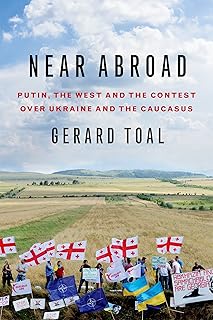Price: $26.53
Before Russia’s infamous incursion into Ukraine, it had already infiltrated Georgia. These two nations are part of what is known as Russia’s “near abroad” – freshly independent states that were once under the Soviet Union’s domain and are now Russia’s immediate neighbors. The Russia-Georgia conflict of 2008 may have faded from the public eye due to the global recession, but the geopolitical rivalry that spawned it continued to simmer. This re-emerged in the spotlight six years later when Putin’s forces invaded and annexed the Crimean peninsula, which although once a part of Russia, had been an internationally recognised part of Ukraine since the fall of the Soviet Union. The annexation of Crimea and the subsequent conflict in eastern Ukraine have triggered the most severe geopolitical crisis in Europe since the Cold War concluded.
In his book, “Near Abroad”, esteemed political geographer Gerard Toal delves beyond the fiery rhetoric surrounding Russia’s actions in Georgia and Ukraine, to examine the root territorial conflicts and geopolitical struggles. Central to understanding these events are the lingering remnants of the Soviet Union’s collapse: unsettled territorial disputes, vulnerable states, and a conflicted geopolitical culture in Russia over the new territorial layout. The West’s ambition to enlarge NATO has further stoked the flames of geopolitical rivalry in Russia’s near abroad. This was exemplified in a 2008 NATO declaration that Georgia and Ukraine would eventually join the alliance, a move that Russia considered a “red line” issue. The journey to invasion and conflict in Georgia and Ukraine is meticulously explained in “Near Abroad”.
Geopolitics is often analogised to a game of chess. “Near Abroad” presents a reality-based portrayal of geopolitics, highlighting dynamic spatial relationships, evolving geopolitical cultures, and the influential power of media imagery. Rather than being a calculated game of strategy, geopolitics is often propelled by emotions, ambitions, by the quest for freedom and greatness, and by clashing personalities and impulsive acts. “Near Abroad” is

